Las Mesitas
Here's the essay I wrote for this week's class. It definitely needs some work, but at least it's a start - at least, it's something!!!!
It’s eleven-thirty in the morning when we arrive in el campo. We have been told a bit about the rural communities of El Salvador during our orientation, but nothing can quite prepare us for the odd juxtaposition of a falling down outhouse accompanied by powdered lye with a homemade computer CD drive that imports my son’s Orange Sky soundtrack and that runs on bi-weekly charged car batteries. We know it’s the year 2005, but we can’t quite reconcile our growing awareness as we walk around the community, that in spite of our solid connection to a global economy via the digital world that we access through cell phone, internet, and television, here, in this place, there are few signs of the modern world, and few opportunities to reach beyond the perimeter that defines their compound.
but nothing can quite prepare us for the odd juxtaposition of a falling down outhouse accompanied by powdered lye with a homemade computer CD drive that imports my son’s Orange Sky soundtrack and that runs on bi-weekly charged car batteries. We know it’s the year 2005, but we can’t quite reconcile our growing awareness as we walk around the community, that in spite of our solid connection to a global economy via the digital world that we access through cell phone, internet, and television, here, in this place, there are few signs of the modern world, and few opportunities to reach beyond the perimeter that defines their compound.
Sam and I have volunteered to participate in a 13-person delegation to visit El Salvador from Cambridge, Massachusetts. Our mission is one of solidarity. Our job is not really about doing, but rather about seeing. We are there to “encounter the other.” When we arrive in Las Mesitas we are told that 90 families live together on this small southeastern track of land, and that as a rural community they have agreed to host our group in hopes of learning more about the United States, and in hopes of helping us to learn more about the plight of the rural farmer in El Salvador.
We are told that our group will be divided into twos and threes, and that a group of families has volunteered to house and feed us while we tour their area, and learn more about their particular way of life.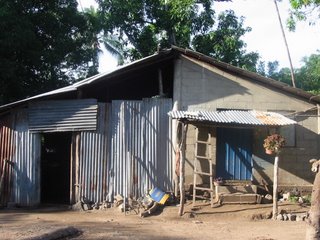 We are told that we will be entering a community where basic resources of clean water, electricity, education, and food are not easily accessed, nor readily available. We do not necessarily realize that we are coming to a place where few families have running water, and where some families have only their cinderblock house, a handful of clothes, and a single chicken, shared by many, to call their own.
We are told that we will be entering a community where basic resources of clean water, electricity, education, and food are not easily accessed, nor readily available. We do not necessarily realize that we are coming to a place where few families have running water, and where some families have only their cinderblock house, a handful of clothes, and a single chicken, shared by many, to call their own.
As we drive up to the edge of the community in a small tour bus, our vehicle is the only car on a small dirt road leading into the region. There are several young men on bicycles, but once we arrive we learn that few people drive. There are cars that come through the compound once a day, and one can buy a ride into the city for $10 (a weekly wage for many in this part of the countryside). We arrive just before lunch and unload the bus. Most of us have brought a backpack with a few personal items, toiletries, and a change of clothes to last us the three days we’ll be spending with the families.
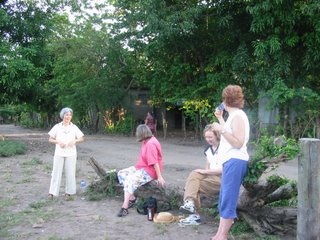 As we disembark, we hear an announcement in Spanish on the community loudspeaker:
As we disembark, we hear an announcement in Spanish on the community loudspeaker:
“Calling all who promised to care for these families, come, they’re here. It’s time for you all to come and prepare the lunches. Come, get the water.”
We have brought gallons of bottled water with us because the water here is not safe for us to drink. I marvel at the communication system as women begin to gather near the family home of the Coordinating Regional Office community leader. There are two loudspeakers on a pole, reminding me of old M.A.S.H. episodes, the only other place I remember seeing that type of set-up. Many within our group don’t speak Spanish and as the women arrive, to sort out how to divide up the visitors, a young woman carrying a small child is told that she can take Sam and I, and that I speak Spanish.
I feel as though I’m being auctioned off, and that somehow my ability to speak Spanish makes me a good prize, and suddenly I panic that my Spanish is not good enough, and that somehow I will be a disappointment to the family to whom we’ve been given. As we walk, I realize it’s just that this whole adventure has me feeling quite vulnerable. I try to focus on taking in my surroundings. The woman who is accompanying us is pretty. She is twenty-three or twenty four I think. She has brown skin, long black hair tied up, and she has a beautiful baby in her arms. Estefi Sarai is the baby’s name, and I estimate her at about a year old.
Slowly, as we walk through the family areas, I start to take in the scene. Our hostess is barefooted. Everywhere there is a dirt floor – a sandy brown dirt. Soft, but sandy.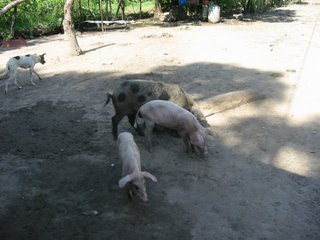 Around us everywhere are animals – dogs, cows, pigs, chickens. The animals are just wandering around, in every state of being – big one, little ones. We cross a kind of roadway and reach Lucia’s house.
Around us everywhere are animals – dogs, cows, pigs, chickens. The animals are just wandering around, in every state of being – big one, little ones. We cross a kind of roadway and reach Lucia’s house.
The woman who has brought us here is Lucia’s daughter, but she does not stay. She lives in a family area near by, but leaves before I find out her name. Lucia has four daughters, I meet three of them. Hola, we say. Mucho gusto, I say – my pleasure. Beinvenidos, Lucia says - welcome. “I’m making you lunch,” she says. “Come in, sit down.”
I sit with Sam. She has set a table for us. Two red plastic chairs like the ones I bought last summer at K-Mart for the backyard sit opposite one another with a simple wooden table that is covered by a plastic tablecloth with a tropical print. Lucia asks if we want ice.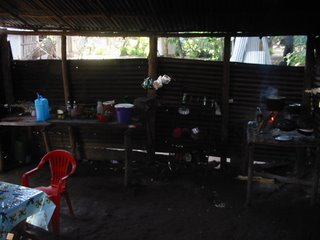 I say sure, wanting to be as accommodating as possible from the beginning, and she sends her youngest daughter for the first of many special trips to the store for us. She has prepared rice and chicken, a homemade pineapple juice and tortillas.
I say sure, wanting to be as accommodating as possible from the beginning, and she sends her youngest daughter for the first of many special trips to the store for us. She has prepared rice and chicken, a homemade pineapple juice and tortillas.
I immediately feel guilty – meat – chicken – I know this must cost her. She doesn’t have extra chickens hanging around as far as I can see. (I find out within a day that she works quite diligently to ensure that her one chicken lays an egg each day, and that too is saved for me while we are here.) She and her fourteen-year-old daughter, Brenda, watch Sam and I as we eat. I quickly must tell her that Sam doesn’t eat anything except bread and fruit, and she quickly sends her daughter out again, this time to buy oranges. Sam’s picky eating takes on a new meaning in this environment. Lucia offers him a banana.
There is a baby on the floor, the daughter of Lucia’s daughter, Areli. The baby is quite dirty and as she sits on the floor she plays with a plastic bottle cap, putting it in her mouth and then dropping it, putting dirt in her mouth each time. Sam stares at me with fear in his eyes, and whispers, “is that ok, mom?” I nod yes. I try really hard not to judge. And I immediately feel Brenda – watching me – watching me judge. I try to control my reactions. I try not to shudder inside as I think of all the privileges my babies had.
After we eat, I slowly try to find my bearings. Lucia has four daughters. Two who are married and in their twenties who do not live with her, a nineteen year old who is not married and raising her six month old daughter and Brenda.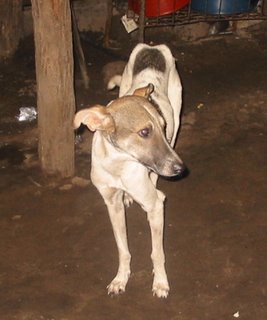 Then there is Corbata, the dog, who is very skinny. Lucia’s husband, Saul, is out fishing.
Then there is Corbata, the dog, who is very skinny. Lucia’s husband, Saul, is out fishing.
When we are done eating I try to make a little conversation, but I can barely understand the rural broken Spanish that is spoken here. Lucia doesn’t understand why Sam doesn’t speak Spanish and I do. She wants to know how I can understand him. I explain that we speak English at home.
After lunch, our group is given a tour of the town. Las Mesitas is close to delta of the Lempa River, and we visit the fish ponds that have sustained this community in the past.
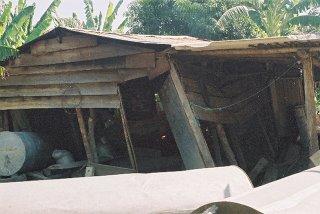
As it turns out, we have arrived just a month after severe flooding from Hurricane Stan, and we learn that all along the fish ponds and the surrounding area the levees have broken and much of the area has been destroyed. We begin to hear how the town and the surrounding areas were affected by the hurricane, and we learn that for many, the hurricane brought complete devastation.
Everywhere we go, it’s pretty much the same – dirt, pigs, skinny dogs, chickens, people who have lost almost everything. All around us are girls in skirts and tight sleeveless shirts, carrying water or bowls of maiz on their heads, women wearing aprons slapping tortillas together, and small groups of children walking around and doing chores. I just start to really appreciate the generosity and vulnerability not only of the families who have taken us in, but of the organization which has hosted our trip. I just start to appreciate the impact which visiting this community will have on me in the years to come.
It’s eleven-thirty in the morning when we arrive in el campo. We have been told a bit about the rural communities of El Salvador during our orientation,
 but nothing can quite prepare us for the odd juxtaposition of a falling down outhouse accompanied by powdered lye with a homemade computer CD drive that imports my son’s Orange Sky soundtrack and that runs on bi-weekly charged car batteries. We know it’s the year 2005, but we can’t quite reconcile our growing awareness as we walk around the community, that in spite of our solid connection to a global economy via the digital world that we access through cell phone, internet, and television, here, in this place, there are few signs of the modern world, and few opportunities to reach beyond the perimeter that defines their compound.
but nothing can quite prepare us for the odd juxtaposition of a falling down outhouse accompanied by powdered lye with a homemade computer CD drive that imports my son’s Orange Sky soundtrack and that runs on bi-weekly charged car batteries. We know it’s the year 2005, but we can’t quite reconcile our growing awareness as we walk around the community, that in spite of our solid connection to a global economy via the digital world that we access through cell phone, internet, and television, here, in this place, there are few signs of the modern world, and few opportunities to reach beyond the perimeter that defines their compound.Sam and I have volunteered to participate in a 13-person delegation to visit El Salvador from Cambridge, Massachusetts. Our mission is one of solidarity. Our job is not really about doing, but rather about seeing. We are there to “encounter the other.” When we arrive in Las Mesitas we are told that 90 families live together on this small southeastern track of land, and that as a rural community they have agreed to host our group in hopes of learning more about the United States, and in hopes of helping us to learn more about the plight of the rural farmer in El Salvador.
We are told that our group will be divided into twos and threes, and that a group of families has volunteered to house and feed us while we tour their area, and learn more about their particular way of life.
 We are told that we will be entering a community where basic resources of clean water, electricity, education, and food are not easily accessed, nor readily available. We do not necessarily realize that we are coming to a place where few families have running water, and where some families have only their cinderblock house, a handful of clothes, and a single chicken, shared by many, to call their own.
We are told that we will be entering a community where basic resources of clean water, electricity, education, and food are not easily accessed, nor readily available. We do not necessarily realize that we are coming to a place where few families have running water, and where some families have only their cinderblock house, a handful of clothes, and a single chicken, shared by many, to call their own.As we drive up to the edge of the community in a small tour bus, our vehicle is the only car on a small dirt road leading into the region. There are several young men on bicycles, but once we arrive we learn that few people drive. There are cars that come through the compound once a day, and one can buy a ride into the city for $10 (a weekly wage for many in this part of the countryside). We arrive just before lunch and unload the bus. Most of us have brought a backpack with a few personal items, toiletries, and a change of clothes to last us the three days we’ll be spending with the families.
 As we disembark, we hear an announcement in Spanish on the community loudspeaker:
As we disembark, we hear an announcement in Spanish on the community loudspeaker:“Calling all who promised to care for these families, come, they’re here. It’s time for you all to come and prepare the lunches. Come, get the water.”
We have brought gallons of bottled water with us because the water here is not safe for us to drink. I marvel at the communication system as women begin to gather near the family home of the Coordinating Regional Office community leader. There are two loudspeakers on a pole, reminding me of old M.A.S.H. episodes, the only other place I remember seeing that type of set-up. Many within our group don’t speak Spanish and as the women arrive, to sort out how to divide up the visitors, a young woman carrying a small child is told that she can take Sam and I, and that I speak Spanish.
I feel as though I’m being auctioned off, and that somehow my ability to speak Spanish makes me a good prize, and suddenly I panic that my Spanish is not good enough, and that somehow I will be a disappointment to the family to whom we’ve been given. As we walk, I realize it’s just that this whole adventure has me feeling quite vulnerable. I try to focus on taking in my surroundings. The woman who is accompanying us is pretty. She is twenty-three or twenty four I think. She has brown skin, long black hair tied up, and she has a beautiful baby in her arms. Estefi Sarai is the baby’s name, and I estimate her at about a year old.
Slowly, as we walk through the family areas, I start to take in the scene. Our hostess is barefooted. Everywhere there is a dirt floor – a sandy brown dirt. Soft, but sandy.
 Around us everywhere are animals – dogs, cows, pigs, chickens. The animals are just wandering around, in every state of being – big one, little ones. We cross a kind of roadway and reach Lucia’s house.
Around us everywhere are animals – dogs, cows, pigs, chickens. The animals are just wandering around, in every state of being – big one, little ones. We cross a kind of roadway and reach Lucia’s house. The woman who has brought us here is Lucia’s daughter, but she does not stay. She lives in a family area near by, but leaves before I find out her name. Lucia has four daughters, I meet three of them. Hola, we say. Mucho gusto, I say – my pleasure. Beinvenidos, Lucia says - welcome. “I’m making you lunch,” she says. “Come in, sit down.”
I sit with Sam. She has set a table for us. Two red plastic chairs like the ones I bought last summer at K-Mart for the backyard sit opposite one another with a simple wooden table that is covered by a plastic tablecloth with a tropical print. Lucia asks if we want ice.
 I say sure, wanting to be as accommodating as possible from the beginning, and she sends her youngest daughter for the first of many special trips to the store for us. She has prepared rice and chicken, a homemade pineapple juice and tortillas.
I say sure, wanting to be as accommodating as possible from the beginning, and she sends her youngest daughter for the first of many special trips to the store for us. She has prepared rice and chicken, a homemade pineapple juice and tortillas.I immediately feel guilty – meat – chicken – I know this must cost her. She doesn’t have extra chickens hanging around as far as I can see. (I find out within a day that she works quite diligently to ensure that her one chicken lays an egg each day, and that too is saved for me while we are here.) She and her fourteen-year-old daughter, Brenda, watch Sam and I as we eat. I quickly must tell her that Sam doesn’t eat anything except bread and fruit, and she quickly sends her daughter out again, this time to buy oranges. Sam’s picky eating takes on a new meaning in this environment. Lucia offers him a banana.
There is a baby on the floor, the daughter of Lucia’s daughter, Areli. The baby is quite dirty and as she sits on the floor she plays with a plastic bottle cap, putting it in her mouth and then dropping it, putting dirt in her mouth each time. Sam stares at me with fear in his eyes, and whispers, “is that ok, mom?” I nod yes. I try really hard not to judge. And I immediately feel Brenda – watching me – watching me judge. I try to control my reactions. I try not to shudder inside as I think of all the privileges my babies had.
After we eat, I slowly try to find my bearings. Lucia has four daughters. Two who are married and in their twenties who do not live with her, a nineteen year old who is not married and raising her six month old daughter and Brenda.
 Then there is Corbata, the dog, who is very skinny. Lucia’s husband, Saul, is out fishing.
Then there is Corbata, the dog, who is very skinny. Lucia’s husband, Saul, is out fishing. When we are done eating I try to make a little conversation, but I can barely understand the rural broken Spanish that is spoken here. Lucia doesn’t understand why Sam doesn’t speak Spanish and I do. She wants to know how I can understand him. I explain that we speak English at home.
After lunch, our group is given a tour of the town. Las Mesitas is close to delta of the Lempa River, and we visit the fish ponds that have sustained this community in the past.

As it turns out, we have arrived just a month after severe flooding from Hurricane Stan, and we learn that all along the fish ponds and the surrounding area the levees have broken and much of the area has been destroyed. We begin to hear how the town and the surrounding areas were affected by the hurricane, and we learn that for many, the hurricane brought complete devastation.
Everywhere we go, it’s pretty much the same – dirt, pigs, skinny dogs, chickens, people who have lost almost everything. All around us are girls in skirts and tight sleeveless shirts, carrying water or bowls of maiz on their heads, women wearing aprons slapping tortillas together, and small groups of children walking around and doing chores. I just start to really appreciate the generosity and vulnerability not only of the families who have taken us in, but of the organization which has hosted our trip. I just start to appreciate the impact which visiting this community will have on me in the years to come.

Comments